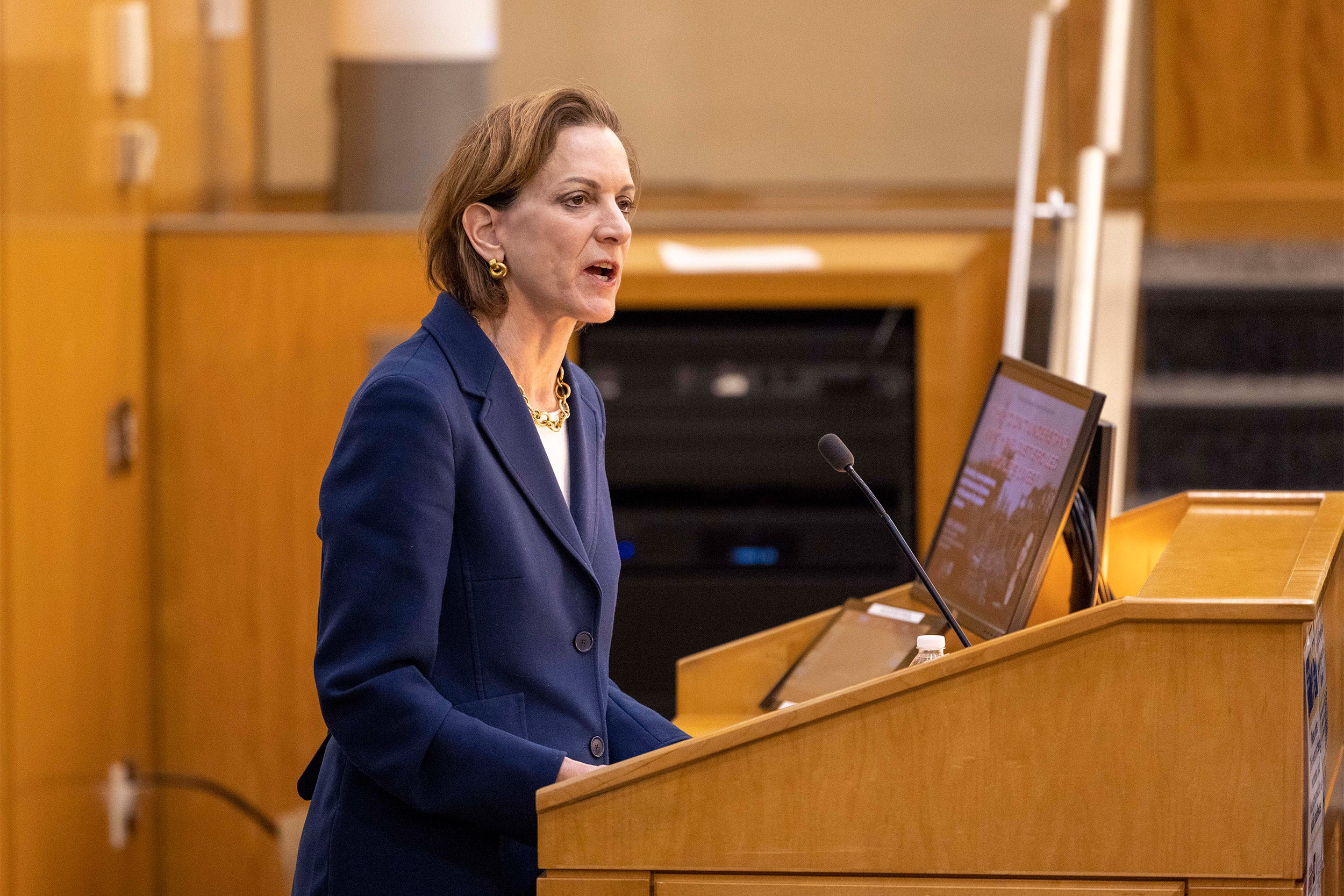
Russia’s “utter disregard for Ukrainian life” stems in part from their inability to bend the Ukrainians to their will and an inability to understand why they have resisted so fiercely, said Anne Applebaum.
Photo by Scott Eisen
Why Soviet playbook isn’t working in Ukraine
Pulitzer-winning journalist says Russians misjudged resistance, their troops lack sense of mission, leading to ‘nihilism’ of wider, more random destruction
It has been nearly 80 years since the Soviet Union successfully beat back Hitler’s invasion during World War II and survived its greatest existential threat of the modern era. Today, the Russian Army appears to be following the same playbook the Soviets once used to consolidate power in Eastern Europe after the war to control occupied territories in Ukraine, according to Pulitzer-winning journalist Anne Applebaum.
Except this time, on the battlefields, in local town halls, and in the schools, none of it is working.
Having misjudged the strength of Ukrainian resistance and the ill-preparedness of Russian troops, and without a clear ideological sense of mission in Ukraine, a frustrated and failing Russian military has intensified its campaign of brutality against civilians.
“That’s the cycle that we’re in now, this kind of failure and incompetence leads to violence. The violence creates more resistance and that resistance that’s so hard for the invaders to comprehend creates wider and broader and ever-more-random destruction and suffering,” said Applebaum during the Harvard Ukrainian Research Institute’s annual Petryshyn Memorial Lecture on Wednesday evening. “This is the logic of genocide” unfolding today in the cities and towns still under occupation.
Applebaum has written extensively about the history of Ukraine and Russia, including “Red Famine,” a 2017 book about the starvation deaths of at least 4 million Ukrainians due to Stalin’s policies in the early 1930s. In her address she spoke about what she and the journalists and field researchers from The Reckoning Project, which documents Russian war crimes, have been learning through investigations into the Russian army’s activities and abuses in Ukraine.
Since the full-scale invasion last February, it has become clear that “the Russian occupation belongs to an equally old and equally ugly tradition of both Russian imperialism and Soviet genocide,” Applebaum said.
“In many different ways, the policies that are being carried out by Russian soldiers in Ukraine strongly resemble the policies carried out by Soviet soldiers in occupied Central Europe, in Poland, in Hungary, in the Baltic states, [and] in Czechoslovakia after 1945,” she said.
While there are “some nuances” and “differences,” reports from formerly occupied areas, particularly in Eastern Ukraine, indicate that the Russian army is still following the Soviet playbook for “how to subjugate a population, how to change its habits, how to even change its identity. These are all things that have been tried before and they are being tried again now,” said Applebaum, who is also a staff writer at The Atlantic.
Investigators have found evidence of torture chambers, and interviews with ordinary citizens and small-town officials in now-liberated areas say the Russian soldiers held people captive, tortured some with electric shocks, physically and psychologically abused them, and subjected them to starvation, extreme cold, even drowning.
The “nihilism of this invasion” is evident in the way Russia has treated schools in occupied Ukraine. Where the Red Army prioritized and carefully executed its plan to reshape school curricula and teaching from kindergarten up, “quite a lot of evidence suggests that Moscow had bigger plans for Ukrainian schools, but the soldiers on the ground could not implement them” and “don’t really seem to care what happened in the schools,” said Applebaum.
The Russian army’s shortcomings as a fighting force have been evident since the war’s earliest days. But the Russian soldiers also seemed not to have any idea what they were supposed to do once they removed mayors and village leaders from office.
“Unlike their Soviet Communist forebearers, who could at least name the ideology that had driven them into Poland or Estonia or Romania, the modern Russian army seems to have no coherent theory of government or administration, no concrete plans to run the region, not even any clear idea of Russkiy Mir — the Russian world, this phrase some of President [Vladimir] Putin’s ideologues extol. They don’t know what it means; they don’t know how to bring it about; they don’t know who would create it or how that would happen,” said Applebaum. “They do this immense damage, but they don’t seem to know why.”
The horrific and unprovoked violence and the “utter disregard for Ukrainian life” stems in part from the Russians’ inability to bend the Ukrainians to their will and an inability to understand why they have resisted so fiercely, she said.
The Russians came to Ukraine expecting a very different situation and are now intent on destroying what they found instead.
“Wishing Ukraine away or wishing this Ukrainian identity to disappear will not make it disappear, and rewriting history will not alter the historical memories of millions of people,” she said. “Russia can try to alter the region, but that will not alter the region no matter how many people are beaten, or electric shocks are delivered.”
Asked what the future of Russia looks like after the war, Applebaum said she wasn’t sure, but that the “most important” thing that “has to happen” is recognition.
“That is the moment when the Russian elites, or the Russian leader or whoever is calling the shots at the moment, when they understand and are able to say that the war was a mistake, and that Ukraine is an independent country.
“Whoever comes after Putin is better. Whoever the worst person you can think of is still better because that person will not have the same legitimacy and the same amount of power that he does,” and will take a long time to reassert the power and control Putin currently enjoys, she said. “I can only hope that that happens — I don’t know that it will.”




